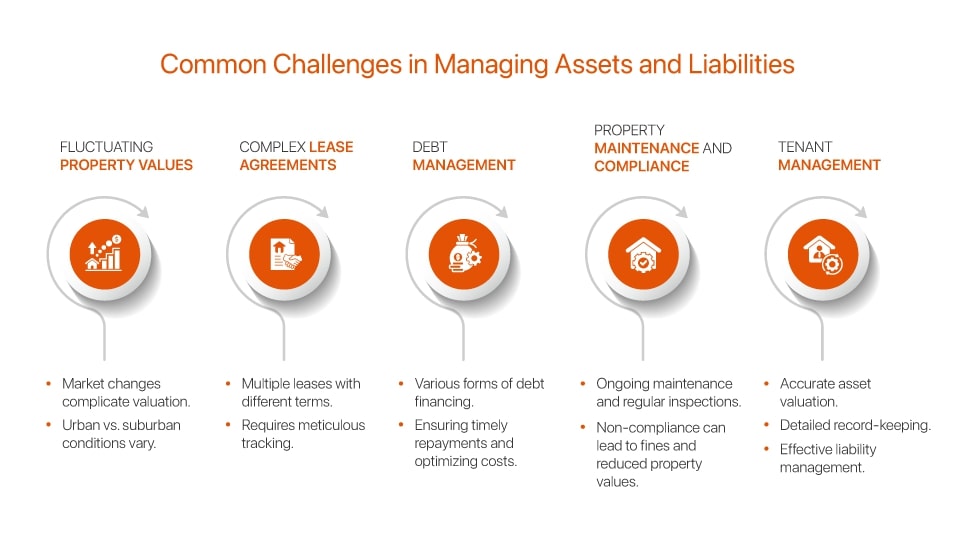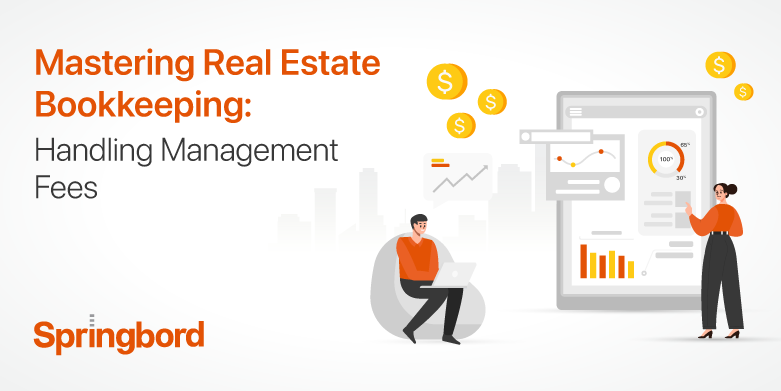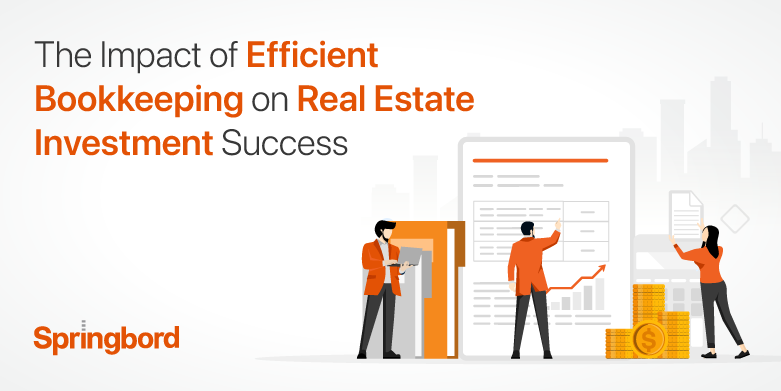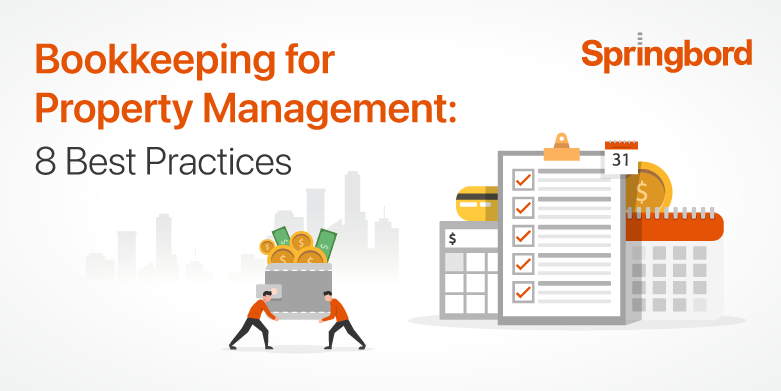 Read time 7 min
Read time 7 minEffective asset and liability management is essential for maintaining financial stability and optimising investment returns in the dynamic and frequently unpredictable world of real estate.
This aspect of financial management involves tracking and balancing the properties and debts held by a real estate business. Proper management allows businesses to maximize the value of their assets while minimizing liabilities, leading to improved financial performance and reduced risk exposure.
This blog will explore the various facets of asset and liability management in real estate, highlighting the indispensable role of professional bookkeeping. At Springbord, we offer specialised bookkeeping services that empower real estate businesses to face these complexities with precision and confidence.
Importance of Asset and Liability Management
Asset and liability management (ALM) in real estate involves the strategic oversight of investments, properties, and obligations. This process is significant for several reasons.
- Risk Mitigation: Effective ALM helps in identifying potential risks and implementing strategies to mitigate them. This includes understanding market fluctuations, interest rate changes, and economic downturns, which can significantly impact real estate values and liabilities.
- Optimized Returns: Properly managed assets lead to optimized returns on investments. This involves regular valuation, maintenance, and improvement of properties to ensure they remain competitive and yield maximum returns.
- Financial Health: Managing liabilities effectively ensures that debt levels are kept in check, maintaining a healthy balance sheet. This is crucial for securing financing and maintaining investor confidence.
Role of Professional Bookkeeping
Enhancing the efficacy of asset and liability management is largely dependent on professional bookkeeping. Here’s how:
- Accurate Financial Records: Professional bookkeeping ensures that all financial transactions are accurately recorded and classified. This provides a clear picture of the business’s financial health and aids in better decision-making.
- Compliance and Reporting: Keeping up with regulatory requirements and financial reporting standards is essential for real estate. Professional bookkeeping services help businesses stay compliant with these regulations, avoiding penalties and ensuring transparency.
- Advanced Financial Analysis: Bookkeeping professionals use advanced tools and techniques to analyze financial data, offering insights into asset performance and liability management. This includes cash flow analysis, debt servicing, and investment appraisal, which are essential for strategic planning.
Common Challenges in Managing Assets and Liabilities

Real estate businesses face several practical challenges in managing assets and liabilities:
- Fluctuating Property Values: The real estate market’s cyclical nature can lead to significant changes in property values, complicating asset valuation and investment decisions. For instance, market conditions can vary drastically between urban and suburban areas, impacting the valuation process.
- Complex Lease Agreements: Managing multiple lease agreements with varying terms and conditions can be challenging. Each lease might have different clauses related to maintenance, rent escalations, and renewals, requiring meticulous tracking and management.
- Debt Management: Real estate businesses often rely on various forms of debt to finance acquisitions and developments. Managing these debts, particularly variable interest loans, and ensuring timely repayments while optimizing interest costs, is a significant challenge.
- Property Maintenance and Compliance: Keeping properties in good condition and compliant with local regulations involves ongoing maintenance and regular inspections. Failure to do so can lead to fines, increased liability, and reduced property values.
- Tenant Management: Effectively managing tenant relationships, including handling disputes, ensuring timely rent collection, and maintaining high occupancy rates, is important for steady cash flow but often challenging.
Professional bookkeeping services play a crucial role in overcoming these challenges.
At Springbord, our expertise ensures accurate asset valuation, meticulous record-keeping, and effective liability management, empowering your business to achieve financial stability and growth.
The Impact of Professional Bookkeeping
Professional bookkeeping is essential for successful asset and liability management.
It provides a structured approach to maintaining accurate financial records, ensuring regulatory compliance, and enhancing overall financial reporting.
Let’s delve into the specific ways professional bookkeeping enhances asset and liability management.
Enhancing Asset and Liability Management
Professional bookkeeping ensures that all financial transactions related to assets and liabilities are accurately recorded and regularly updated. This meticulous record-keeping allows for:
- Accurate Valuation of Assets: Bookkeeping provides detailed records of property acquisition costs, improvements, and depreciation. This data is essential for precise property valuation and investment analysis. Accurate asset valuation ensures that real estate businesses can leverage their properties effectively, whether for securing financing or maximizing returns on investment.
- Effective Liability Tracking: By keeping detailed records of all liabilities, including loans, mortgages, and accounts payable, bookkeeping ensures that businesses are aware of their financial obligations. This helps in managing debts more effectively and planning for timely repayments, thereby maintaining a healthy balance sheet.
Maintaining Accurate and Up-to-Date Financial Records
Accurate financial records are the foundation of good financial management. Professional bookkeeping services ensure:
- Consistency and Accuracy: Regular updates and reviews of financial transactions ensure that records reflect the true financial position of the business. This accuracy is important for making informed business decisions and for financial planning.
- Comprehensive Financial Reporting: Professional bookkeeping enables the generation of detailed financial reports, such as balance sheets, income statements, and cash flow statements. These reports provide a clear picture of the business’s financial health and are essential for internal analysis and external reporting.
Aiding in Regulatory Compliance and Financial Reporting
Regulatory compliance and accurate financial reporting are crucial for the real estate industry. Non-compliance can lead to significant penalties and legal issues. Professional bookkeeping aids in:
- Regulatory Compliance: Bookkeeping services ensure that all financial records are maintained under regulatory requirements. This include adherence to industry-specific rules, financial reporting requirements, and tax legislation. Keeping up with these regulations can be complex, but professional bookkeepers are adept at navigating these requirements.
- Timely and Accurate Reporting: Accurate financial records are essential for timely reporting to stakeholders, including investors, regulatory bodies, and financial institutions. Professional bookkeeping ensures that all financial reports are accurate, comprehensive, and submitted on time, thereby maintaining transparency and trust.
Springbord’s expertise ensures meticulous record-keeping, precise asset and liability management, and seamless regulatory compliance, allowing your business to achieve financial stability and growth.
Asset Management Through Professional Bookkeeping

Managing assets well is essential to optimizing return on investment. Professional bookkeeping provides the techniques and tools necessary to track and manage assets accurately.
Techniques for Tracking and Managing Real Estate Assets
- Property Valuation: Accurate property valuation is fundamental to understanding the true worth of real estate assets. Professional bookkeeping involves regular appraisals and market analysis to ensure properties are valued correctly. This practice helps in making informed investment decisions and securing financing based on the accurate value of assets. For example, the average real estate values for Hispanic households increased by 35% between 2019 and 2023, highlighting the importance of accurate property valuation in wealth accumulation.
- Depreciation Schedules: Real estate assets depreciate over time, impacting their value and the overall financial health of a business. Bookkeepers create and maintain detailed depreciation schedules that track the loss in value of properties due to wear and tear. This allows for accurate financial reporting and tax calculations. According to the IRS, different types of real estate assets have specific depreciation periods, such as 27.5 years for residential rental properties and 39 years for commercial properties.
- Maintenance and Improvement Records: Keeping detailed records of maintenance and improvements is crucial for asset management. Regular maintenance ensures properties remain in good condition, thereby preserving or even enhancing their value. Improvement records help in capitalizing costs that add value to the property, which can be depreciated over time.
Importance of Accurate Asset Tracking for Maximizing Returns on Investment
Accurate asset tracking is essential for maximizing returns on investment in the real estate sector.
It involves a comprehensive approach to managing all aspects of the property lifecycle, from acquisition to disposal. Key benefits of accurate asset tracking include:
- Enhanced Decision-Making: With precise data on property values, depreciation, and maintenance costs, business owners can make informed decisions regarding buying, selling, or improving properties. This strategic approach leads to better investment outcomes and financial performance.
- Optimized Cash Flow: Effective asset management helps in planning and optimizing cash flow. By tracking maintenance schedules and improvement projects, businesses can budget more effectively and avoid unexpected expenses. This ensures a steady income stream and financial stability.
- Regulatory Compliance and Reporting: Accurate records are crucial for regulatory compliance and financial reporting. They ensure that all asset-related transactions are correctly documented, which is essential for audits and regulatory inspections. This transparency builds trust with investors and regulatory bodies.
Our experience at Springbord guarantees precise property appraisal, careful depreciation schedule management, and thorough maintenance and improvement record-keeping.
This enables your company to maximize returns on investment and attain financial stability.
Conclusion
Effective asset and liability management is pivotal for achieving financial stability and maximizing investment returns in the real estate sector.
Professional bookkeeping enhances these processes by providing accurate financial records, ensuring compliance with regulatory standards, and offering advanced financial analysis.
Through meticulous property valuation, detailed depreciation schedules, and comprehensive maintenance records, professional bookkeeping enables businesses to manage their assets and liabilities effectively, optimize cash flow, and make informed decisions.
To help real estate companies navigate these complexities with confidence and achieve sustainable growth, Springbord specializes in providing accurate and thorough bookkeeping services.
Get in touch with Springbord right now for more details on how our specialist bookkeeping services can help your real estate company.
Let us help you enhance your financial management and drive your business toward success.







